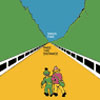 As the current indie scene now falls into lock-step formation rallyingunder the banner of "new folk," I find it interesting to reflect on thefirst folk renaissance, the one that took place five years ago. Youprobably never heard about it because it took place largely in my head.After years spent obsessively listening to and collecting records byCurrent 93, Death in June and Sol Invictus, there weren't many placesfor this jaded listener to go other than the strange, misunderstoodworld of sixties British psych-folk — a loose outcropping ofpsychedelia that incorporated medievalism, folk and free jazz withesoteric lyrical influences and ethnic instrumentation. This music isthe clearest antecedent to the "apocalyptic folk" that resurfaced inthe eighties English underground. Most have at least heard of theIncredible String Band or John Renbourn, but for every famous,influential artist from this period, there were scores of ignoredobscurities like Comus, The Trees and Jan Dukes de Grey. With the helpof an evil book called The Tapestry of Delights, the adventurous (read:compulsive) collector could choose his next Holy Grail and crusadeforth to seek it for his collection. For me, the best of these elusiverecords will always be Pass the Distanceby Simon Finn, an obscure 1970 one-off from London's Mushroom label. Itwas a unique album, not just for its unorthodox musical content, butalso for its extreme rarity, legal action having forced its withdrawalfrom the market not long after is release. Simon Finn's album puzzledme during my original folk renaissance, and five years later — withthis new remastering and rerelease on Durtro/Jnana — it still evadeseasy categorization. Finn's songwriting and vocal style belong to alate-60s tradition of melancholy, doom-laden propheteering, but ontracks like "Jerusalem" and "Big White Car," he displays an unmatchedvocal fury, passionately belting out his words with throat-strippingferocity, building to a pair of frighteningly shattering crescendos.Adding to the album's unique sound are the contributions of the youngmulti-instrumentalist David Toop, who since the recording of Pass the Distance has distinguished himself as a preeminent musical critic, a frequent contributor to The Wireand the author of several books. Toop and percussionist Paul Burwellwere apparently given free reign by producer Vic Keary to use Finn'sstandard folk material as a blank slate for experimentation andimprovisation. This results in a series of loose, chaotic settings forSimon Finn's songs, Toop often climbing up and down the scale of amandolin or a harmonium with utter disregard for melodic sense.Producer and engineer Keary adds another level of mystification, usingheavy echo, stereo panning and excessive phasing to create a sense ofdislocation, muddying the waters of Finn's apocalyptic stream ofconsciousness. This rerelease, overseen by David Tibet and Simon Finn(emerging from more than 30 years of total silence), improves the soundsubstantially from the Japanese bootleg CDs, and adds four bonustracks, which don't share the same mysterious qualities as the materialon the original LP, but are welcome nonetheless. Also included areinformative liner notes from Finn, Toop, Keary and Tibet. This shouldbe a fine replacement for my well-worn vinyl copy.
As the current indie scene now falls into lock-step formation rallyingunder the banner of "new folk," I find it interesting to reflect on thefirst folk renaissance, the one that took place five years ago. Youprobably never heard about it because it took place largely in my head.After years spent obsessively listening to and collecting records byCurrent 93, Death in June and Sol Invictus, there weren't many placesfor this jaded listener to go other than the strange, misunderstoodworld of sixties British psych-folk — a loose outcropping ofpsychedelia that incorporated medievalism, folk and free jazz withesoteric lyrical influences and ethnic instrumentation. This music isthe clearest antecedent to the "apocalyptic folk" that resurfaced inthe eighties English underground. Most have at least heard of theIncredible String Band or John Renbourn, but for every famous,influential artist from this period, there were scores of ignoredobscurities like Comus, The Trees and Jan Dukes de Grey. With the helpof an evil book called The Tapestry of Delights, the adventurous (read:compulsive) collector could choose his next Holy Grail and crusadeforth to seek it for his collection. For me, the best of these elusiverecords will always be Pass the Distanceby Simon Finn, an obscure 1970 one-off from London's Mushroom label. Itwas a unique album, not just for its unorthodox musical content, butalso for its extreme rarity, legal action having forced its withdrawalfrom the market not long after is release. Simon Finn's album puzzledme during my original folk renaissance, and five years later — withthis new remastering and rerelease on Durtro/Jnana — it still evadeseasy categorization. Finn's songwriting and vocal style belong to alate-60s tradition of melancholy, doom-laden propheteering, but ontracks like "Jerusalem" and "Big White Car," he displays an unmatchedvocal fury, passionately belting out his words with throat-strippingferocity, building to a pair of frighteningly shattering crescendos.Adding to the album's unique sound are the contributions of the youngmulti-instrumentalist David Toop, who since the recording of Pass the Distance has distinguished himself as a preeminent musical critic, a frequent contributor to The Wireand the author of several books. Toop and percussionist Paul Burwellwere apparently given free reign by producer Vic Keary to use Finn'sstandard folk material as a blank slate for experimentation andimprovisation. This results in a series of loose, chaotic settings forSimon Finn's songs, Toop often climbing up and down the scale of amandolin or a harmonium with utter disregard for melodic sense.Producer and engineer Keary adds another level of mystification, usingheavy echo, stereo panning and excessive phasing to create a sense ofdislocation, muddying the waters of Finn's apocalyptic stream ofconsciousness. This rerelease, overseen by David Tibet and Simon Finn(emerging from more than 30 years of total silence), improves the soundsubstantially from the Japanese bootleg CDs, and adds four bonustracks, which don't share the same mysterious qualities as the materialon the original LP, but are welcome nonetheless. Also included areinformative liner notes from Finn, Toop, Keary and Tibet. This shouldbe a fine replacement for my well-worn vinyl copy. Read More

